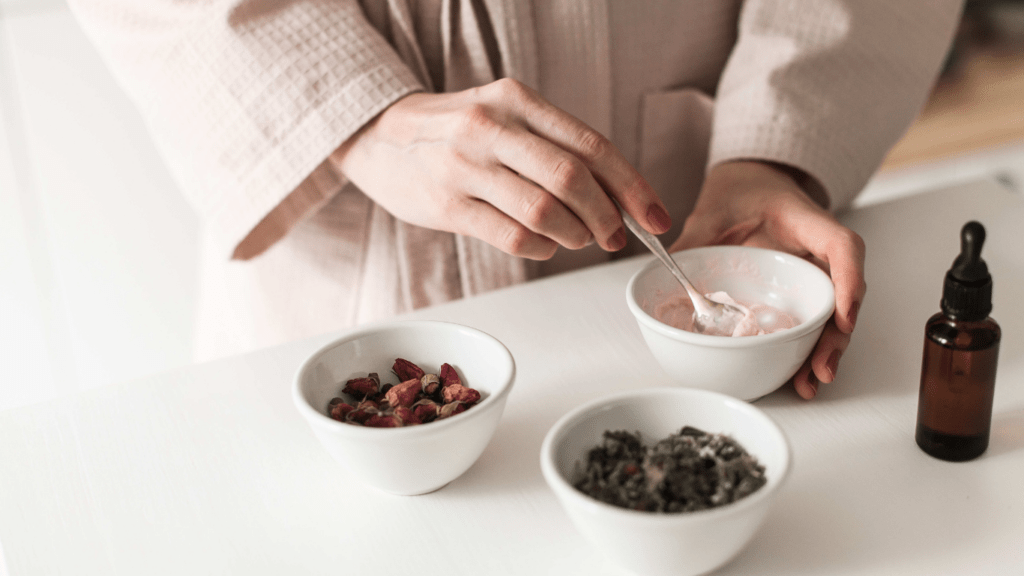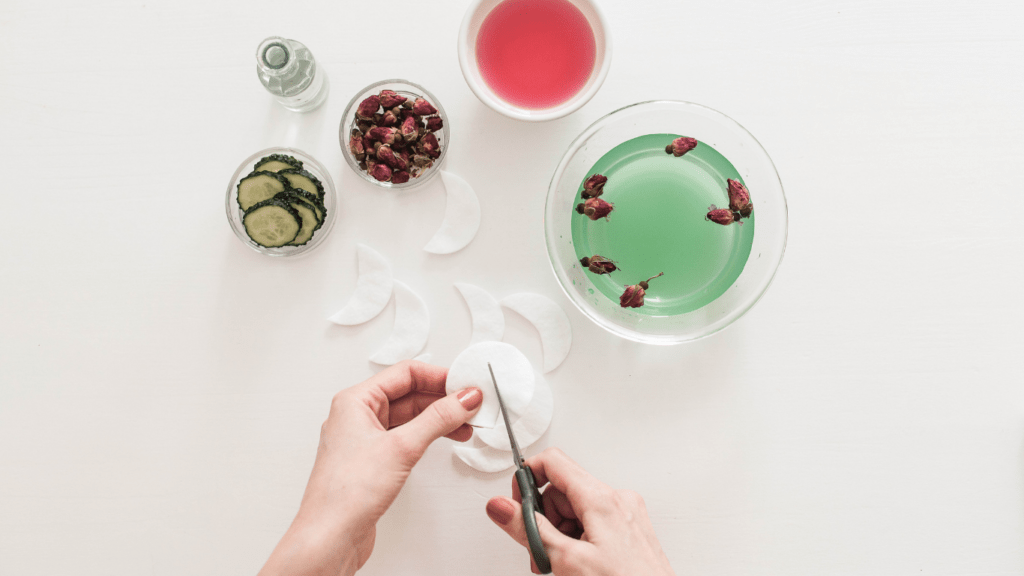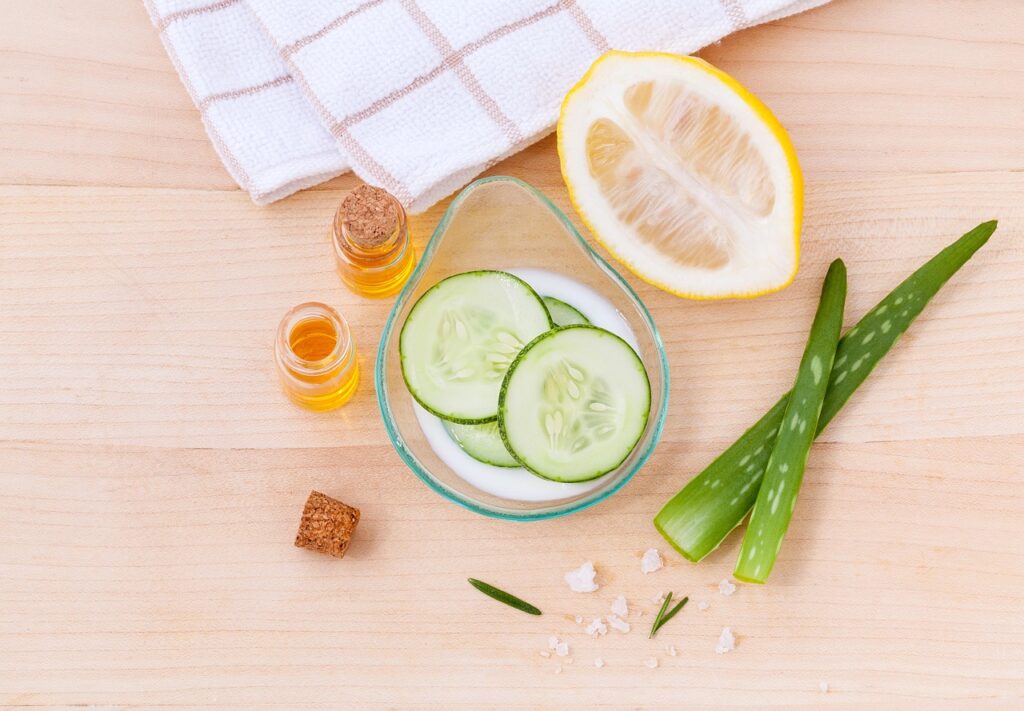Benefits Of Using Natural Skincare
Natural skincare offers multiple benefits for your skin and overall health. It incorporates ingredients that are free from synthetic chemicals, making these products gentler and safer.
Gentle on Skin
Natural ingredients like honey and aloe vera soothe and hydrate skin without causing irritation. Synthetic chemicals in commercial products can cause dryness and allergic reactions. Using natural options significantly reduces such risks.
Environmentally Friendly
Natural skincare products generally come from sustainable sources. Ingredients like coconut oil and shea butter are biodegradable and don’t harm the environment. Most commercial skincare products contain non-biodegradable substances that pollute water sources.
Cost-Effective
Homemade skincare recipes often use affordable ingredients you may already have in your kitchen. For example, oatmeal can be used as a gentle exfoliant, and olive oil serves as a moisturizing agent. This helps save money compared to buying high-end skincare items.
Customizable
Natural skincare lets you tailor products to meet your specific needs. If you have dry skin, you can add more moisturizing components like avocado or honey. For oily skin, lemon juice or tea tree oil effectively manage excess oil. Customization ensures optimal results for your skin type.
Free from Harmful Additives
Commercial skincare products often contain preservatives and artificial fragrances. These additives can lead to long-term health issues, such as hormonal imbalances. Natural skincare uses pure ingredients, protecting you from these harmful effects.
Nutrient-Rich
Natural ingredients are often packed with vitamins and antioxidants. For example, rosehip oil is rich in vitamin C and helps brighten skin, while argan oil provides essential fatty acids that nourish and rejuvenate. These nutrients promote healthier, more youthful skin.
Here’s a quick comparison of the benefits:
| Aspect | Natural Skincare | Commercial Skincare |
|---|---|---|
| Skin Irritation | Minimal | High |
| Environmental Impact | Low | High |
| Cost | Low | High |
| Customization | High | Low |
| Harmful Additives | None | Many |
| Nutrient Content | High | Variable |
Incorporating natural ingredients into your skincare routine yields numerous advantages, from enhanced skin health to eco-friendliness.
Essential Ingredients For DIY Skincare

Creating effective DIY skincare products begins with the right ingredients. Understanding the role of each component ensures optimal results.
Carrier Oils
Carrier oils form the base of many skincare recipes. These oils are extracted from nuts and seeds, providing essential fatty acids and vitamins. Examples include:
- Coconut Oil: Moisturizes and nourishes the skin.
- Jojoba Oil: Balances oil production with its similarity to skin’s natural sebum.
- Sweet Almond Oil: Softens skin and improves complexion.
Each carrier oil brings unique properties making it crucial to select the right one for your skin type.
Essential Oils
Essential oils add therapeutic benefits to skincare. Extracted from plants, these oils offer various properties such as antibacterial, anti-inflammatory, and calming effects. Examples are:
- Lavender Oil: Soothes irritation and promotes relaxation.
- Tea Tree Oil: Fights acne due to its antibacterial properties.
- Rosehip Oil: Reduces scars and fine lines with its regenerative qualities.
Using small amounts of essential oils can enhance the effectiveness of your DIY products.
Natural Exfoliants
Natural exfoliants aid in removing dead skin cells, revealing fresh, glowing skin. Common choices include:
- Sugar: Gentle enough for the face while providing effective exfoliation.
- Oatmeal: Soothes and exfoliates, ideal for sensitive skin.
- Coffee Grounds: Stimulates circulation, reducing cellulite appearance.
Selecting the right exfoliant based on skin sensitivity ensures a smoother complexion without causing irritation.
Ensuring a balanced mix of these ingredients can empower your DIY skincare routine, promoting nourishing and glowing skin.
DIY Facial Cleansers
Using natural ingredients, you can create effective facial cleansers at home. These DIY cleansers remove dirt and impurities without harsh chemicals, making them perfect for different skin types.
Gentle Honey Cleanser
Honey boasts antibacterial and moisturizing properties. To make a gentle honey cleanser, mix 1 tablespoon of raw honey with a few drops of water. Spread the mixture on your face, then massage it in circular motions. Rinse with lukewarm water. This cleanser suits all skin types, especially sensitive and acne-prone skin. Honey’s natural enzymes and antioxidants nourish, hydrate, and soothe your skin.
Refreshing Cucumber Cleanser
Cucumber offers cooling and soothing effects. To create a refreshing cucumber cleanser, blend half a cucumber into a smooth pulp. Add 2 tablespoons of plain yogurt and mix thoroughly. Apply the mixture to your face, let it sit for 10 minutes, then rinse with cool water. This cleanser is ideal for oily and combination skin. Cucumber’s hydrating properties and yogurt’s lactic acid help cleanse and tighten pores while maintaining skin’s natural moisture.
By using these simple, natural ingredients, I’ve found that my skin feels cleaner, fresher, and more balanced.
DIY Exfoliators
Exfoliating helps remove dead skin cells, unclog pores, and reveal fresh skin. Using natural ingredients for exfoliation ensures a gentle yet effective treatment.
Coffee Grounds Scrub
Coffee grounds scrub provides a natural exfoliator that can reinvigorate the skin. Mix 1/4 cup of used coffee grounds with 2 tablespoons of coconut oil and 1 tablespoon of honey. The coffee grounds offer gentle abrasion, promoting blood circulation. Coconut oil moisturizes, and honey adds antibacterial properties. Massage the mixture onto damp skin using circular motions, then rinse with warm water. Use this scrub once or twice a week for the best results.
Oatmeal Exfoliating Mask
Oatmeal exfoliating mask suits sensitive skin, offering a soothing exfoliation. Blend 1/2 cup of ground oats with 1/4 cup of plain yogurt and 2 tablespoons of honey. Ground oats provide gentle exfoliation while yogurt introduces lactic acid for mild peeling. Honey, with its antibacterial properties, helps calm inflammation. Apply the mixture to your face, leave it for 15 minutes, and gently rinse with warm water. Repeat weekly to maintain a smooth complexion.
DIY Moisturizers
Creating your own DIY moisturizers helps you avoid synthetic ingredients and customize products for your skin’s needs. Here are two simple yet effective recipes.
Coconut Oil Moisturizer
Coconut oil is an excellent natural moisturizer. Its medium-chain fatty acids provide deep hydration, making it ideal for dry skin. Use virgin, unrefined coconut oil to retain its beneficial properties. Here’s a simple recipe:
Ingredients:
- 1 cup virgin coconut oil
- 1 teaspoon vitamin E oil (optional for added skin benefits)
Instructions:
- Place the coconut oil in a mixing bowl.
- Add the vitamin E oil if using.
- Whip the mixture until light and fluffy (about 5 minutes).
- Transfer to a clean jar with a lid.
Apply the coconut oil moisturizer to clean skin, massaging gently in circular motions. It can also be used as an overnight treatment for extra hydration.
Aloe Vera Gel Moisturizer
Aloe vera gel provides lightweight hydration and soothes irritated skin. Ideal for sensitive or acne-prone skin, it’s known for its anti-inflammatory and healing properties. Here’s a straightforward aloe vera moisturizer:
Ingredients:
- 1/2 cup pure aloe vera gel
- 2 tablespoons rose water (optional for a refreshing scent)
Instructions:
- Combine the aloe vera gel and rose water in a bowl.
- Mix thoroughly until well blended.
- Pour the mixture into a sanitized, airtight container.
Apply the aloe vera gel moisturizer as needed, especially after exposure to the sun to relieve and hydrate the skin.
DIY Face Masks
Creating DIY face masks using natural ingredients offers a powerful way to nourish and pamper the skin. Leveraging items commonly found in the kitchen, these masks are free from harmful additives and tailored to various skin types.
Avocado And Honey Mask
The Avocado And Honey Mask deeply nourishes the skin, providing hydration and essential nutrients. Mash one ripe avocado until smooth. Mix in one tablespoon of honey. This combination hydrates and soothes dry skin, thanks to the healthy fats in avocado and the antibacterial properties of honey. Apply the mixture evenly on your face and let it sit for 15 minutes before rinsing with warm water.
Turmeric Brightening Mask
The Turmeric Brightening Mask offers a natural solution for dull skin and uneven tone. Combine one teaspoon of turmeric powder with two tablespoons of plain yogurt and one teaspoon of honey. Turmeric has anti-inflammatory and brightening qualities, yogurt provides gentle exfoliation due to lactic acid, and honey aids in moisture retention. Apply this mask to the face, leaving it on for 10-15 minutes, then wash off gently with lukewarm water.
Additional Tips For DIY Skincare
Patch Test Ingredients
Perform a patch test to ensure no allergic reactions occur. Apply a small amount of the DIY product to your wrist or behind your ear. Wait 24 hours and check for any redness, itching, or irritation. Use the product more confidently if no reaction occurs.
Use Fresh Ingredients
Use fresh ingredients for the best results and skin benefits. Choose organic produce whenever possible to minimize the risk of pesticides and chemicals. Store ingredients in a cool, dry place to maintain their efficacy.
Label And Date
Clearly label and date your DIY skincare products. Homemade products can spoil faster than commercial ones. Use them within a week or two to ensure freshness and avoid potential skin issues.
Consistency Matters
Use the DIY skincare products consistently for the best results. Introduce one product at a time to monitor your skin’s reaction. Document any changes in your skin’s condition to fine-tune your DIY regimen.
Proper Storage
Store DIY skincare products properly to maintain their quality. Keep them in airtight containers to prevent contamination. Refrigerate items containing perishable ingredients like yogurt or fresh fruit.
Customize Your Recipes
Customize your recipes to suit your skin’s unique needs. Adjust the ingredients or ratios based on skin type, concerns, or sensitivities. Track your skin’s response to make informed adjustments over time.
Stay Hydrated
Maintain hydration for optimal skin health. Drink plenty of water daily and use hydrating ingredients like cucumber or aloe vera in your DIY skincare routine. Hydration helps maintain the skin’s elasticity and glow.
Balance pH Levels
Balance your skin’s pH by using gentle, skin-friendly acids like apple cider vinegar or lemon juice in small amounts. Overuse can cause irritation; monitor your skin’s condition to ensure proper balance.
Avoid Mixing Potent Ingredients
Avoid mixing potent ingredients, like retinol and vitamin C, which can cause adverse reactions. Research ingredient compatibility before creating your DIY products to prevent negative interactions.
Regularly Clean Tools
Regularly clean tools and containers to avoid bacterial contamination. Sterilize with boiling water or rubbing alcohol. Dirty tools can introduce bacteria and reduce the effectiveness of your DIY skincare products.


 Bonnie Brown is an expert in holistic wellness with over a decade of experience in natural health and skincare. She has dedicated her career to helping individuals achieve radiant health through plant-based solutions and mindful self-care practices. Bonnie is passionate about blending ancient traditions with modern wellness techniques, making her insights a valuable resource for anyone on a journey to healthier skin and overall well-being.
Bonnie Brown is an expert in holistic wellness with over a decade of experience in natural health and skincare. She has dedicated her career to helping individuals achieve radiant health through plant-based solutions and mindful self-care practices. Bonnie is passionate about blending ancient traditions with modern wellness techniques, making her insights a valuable resource for anyone on a journey to healthier skin and overall well-being.
